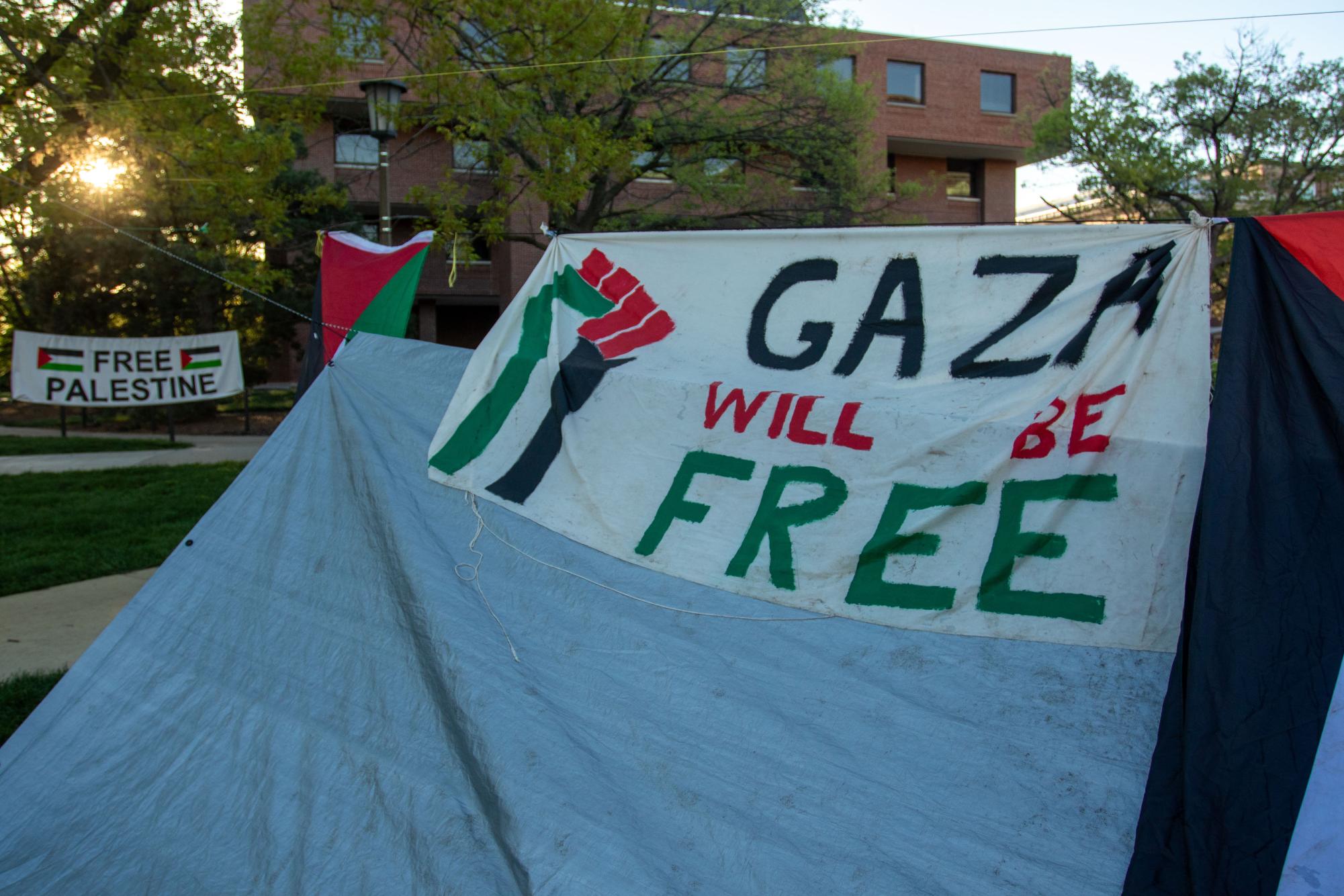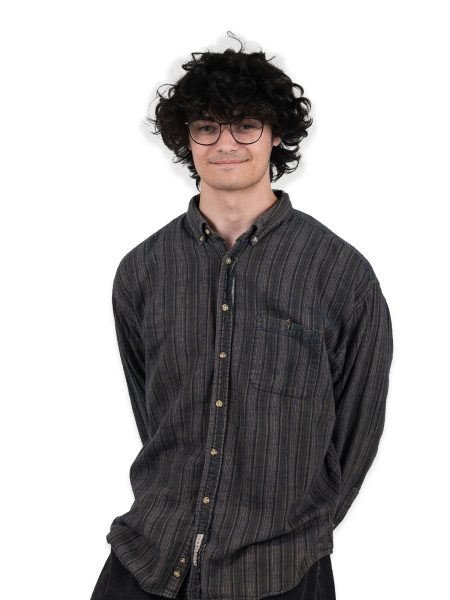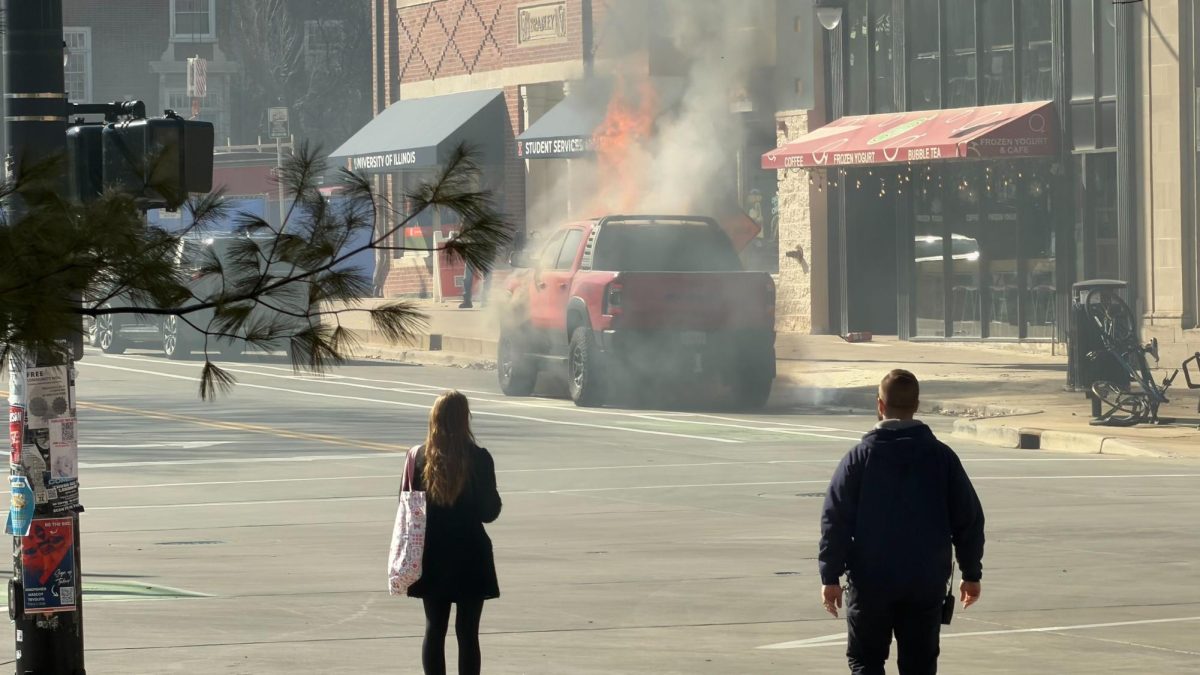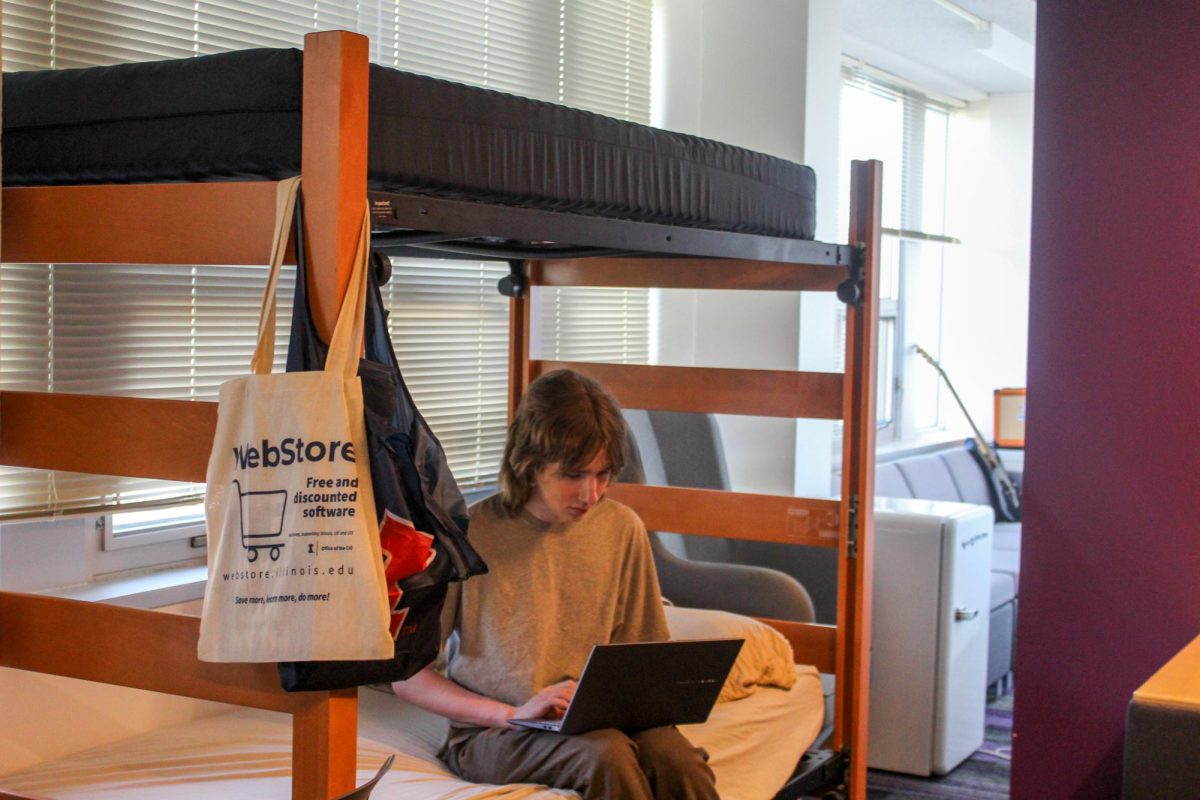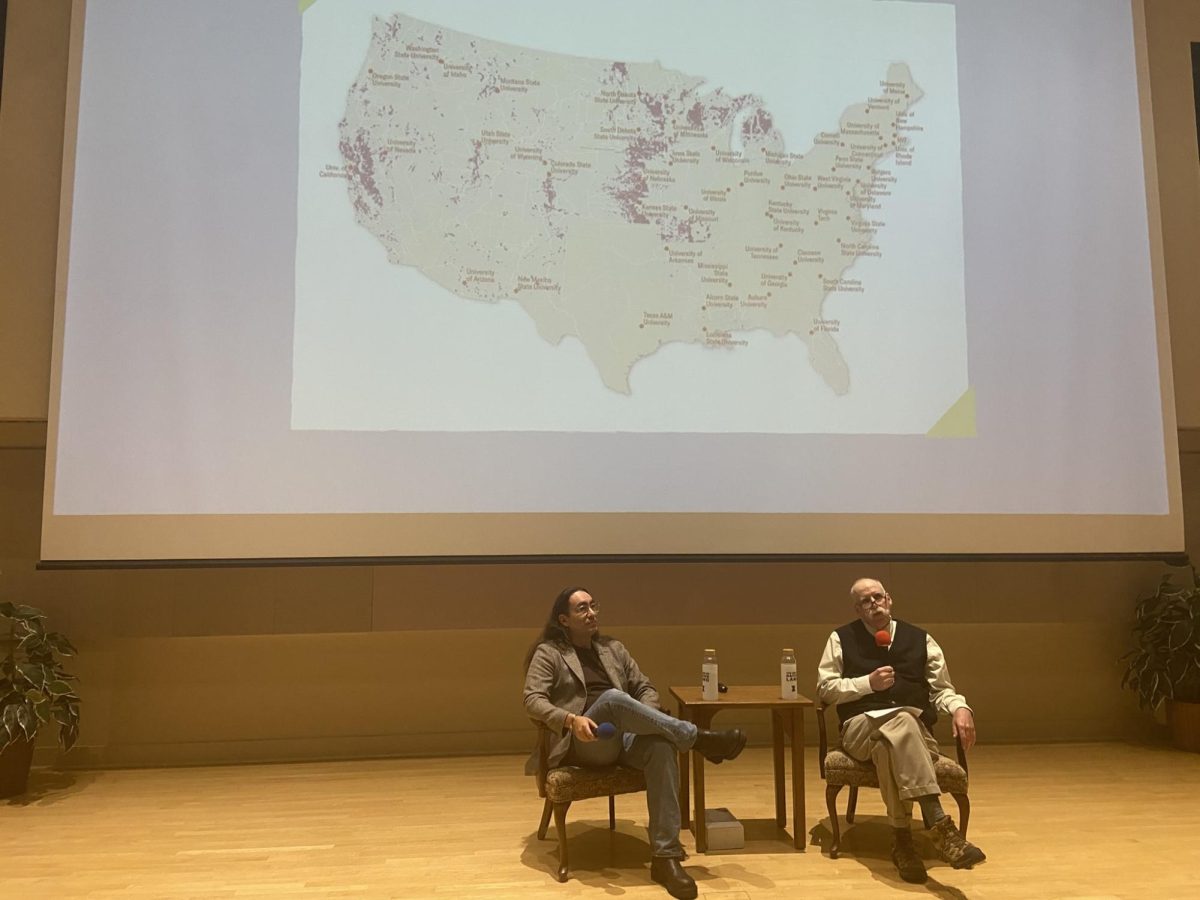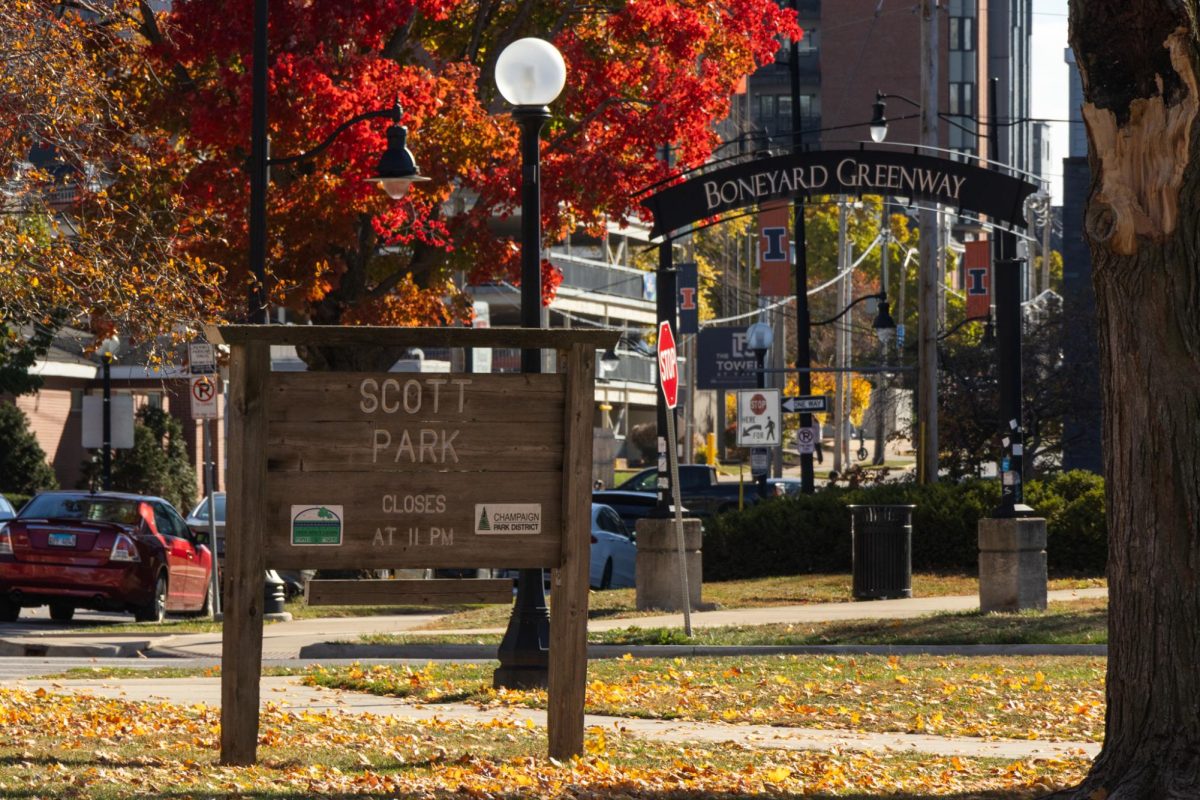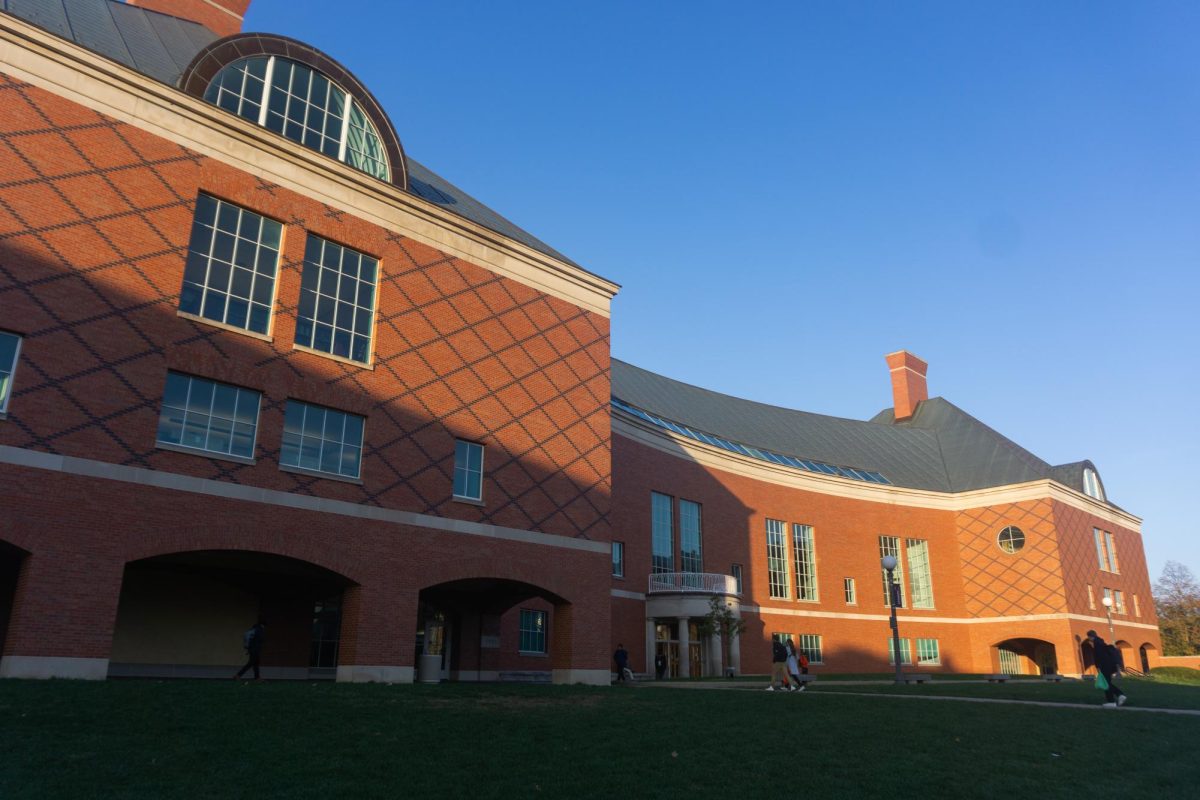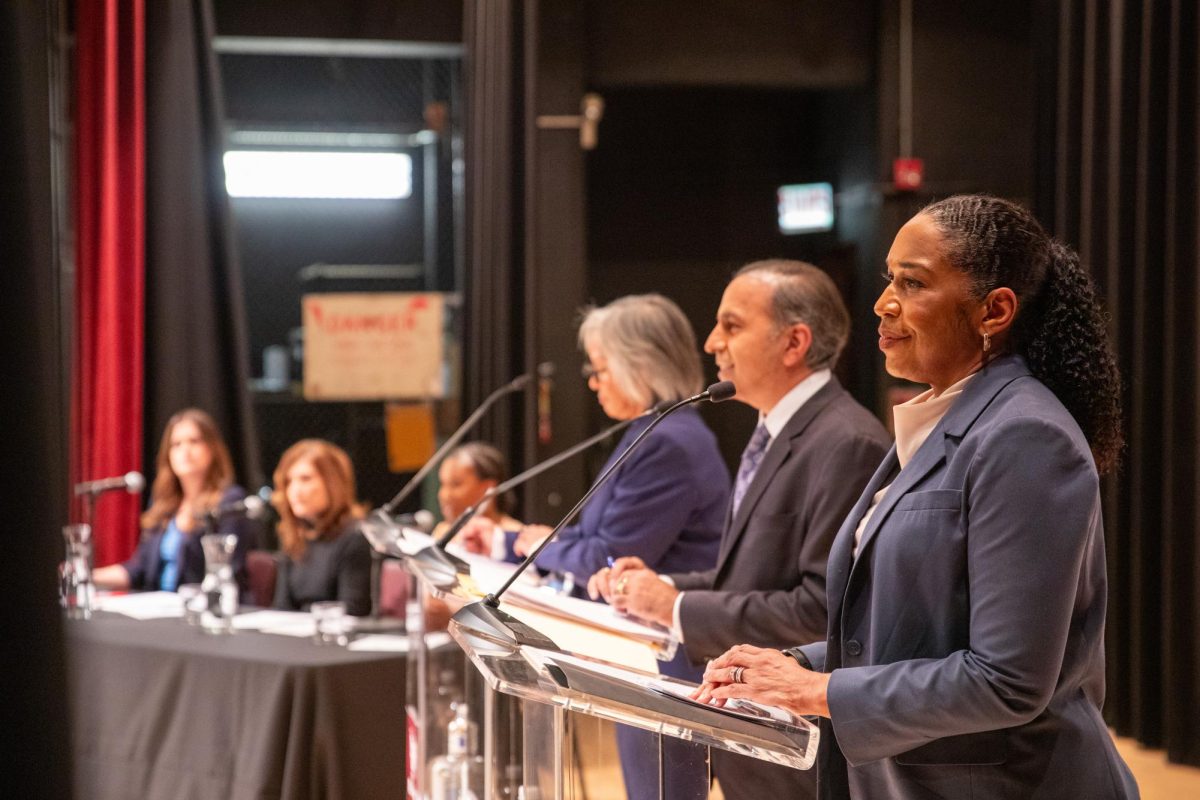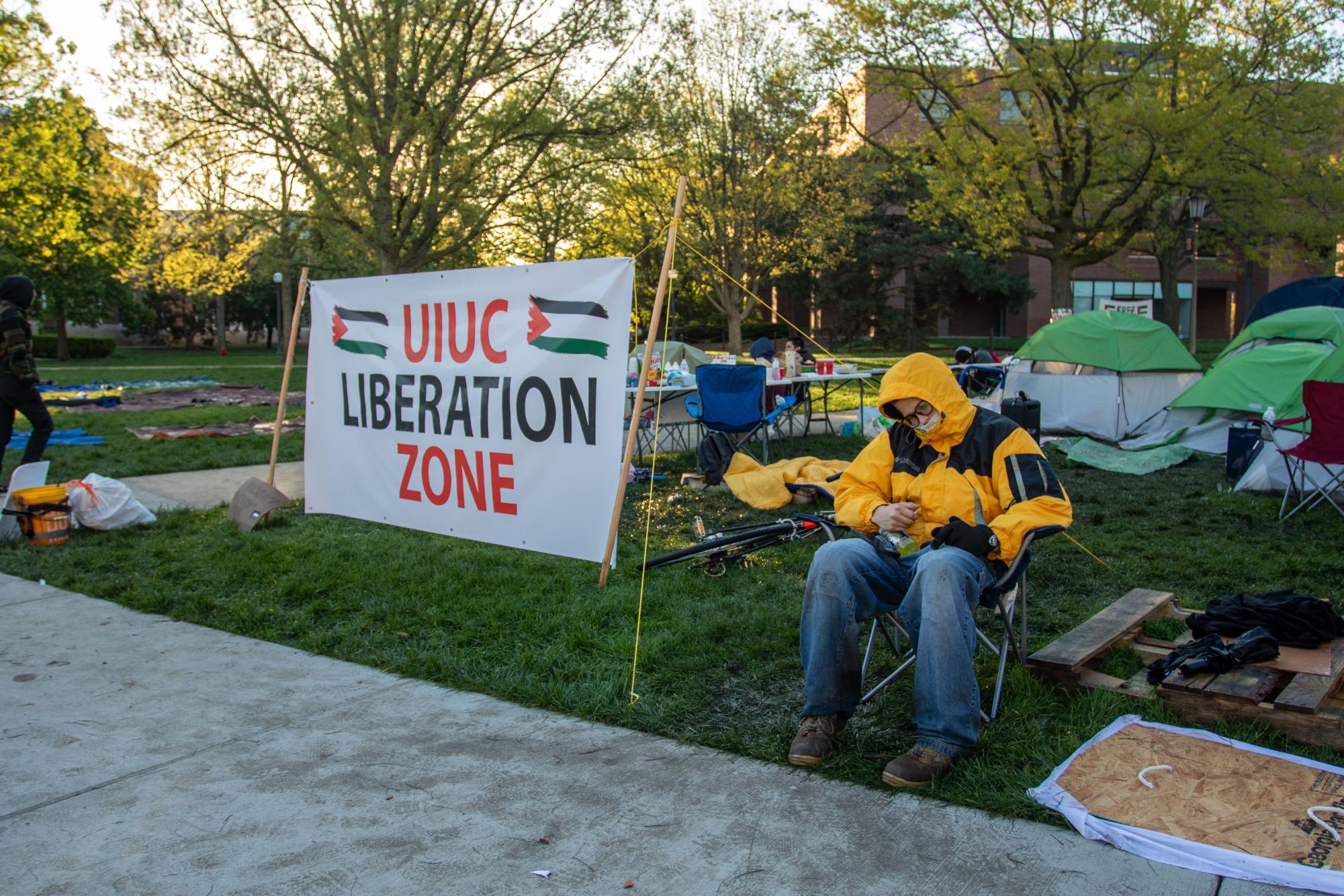
Live coverage: Third day of encampment persists on Main Quad
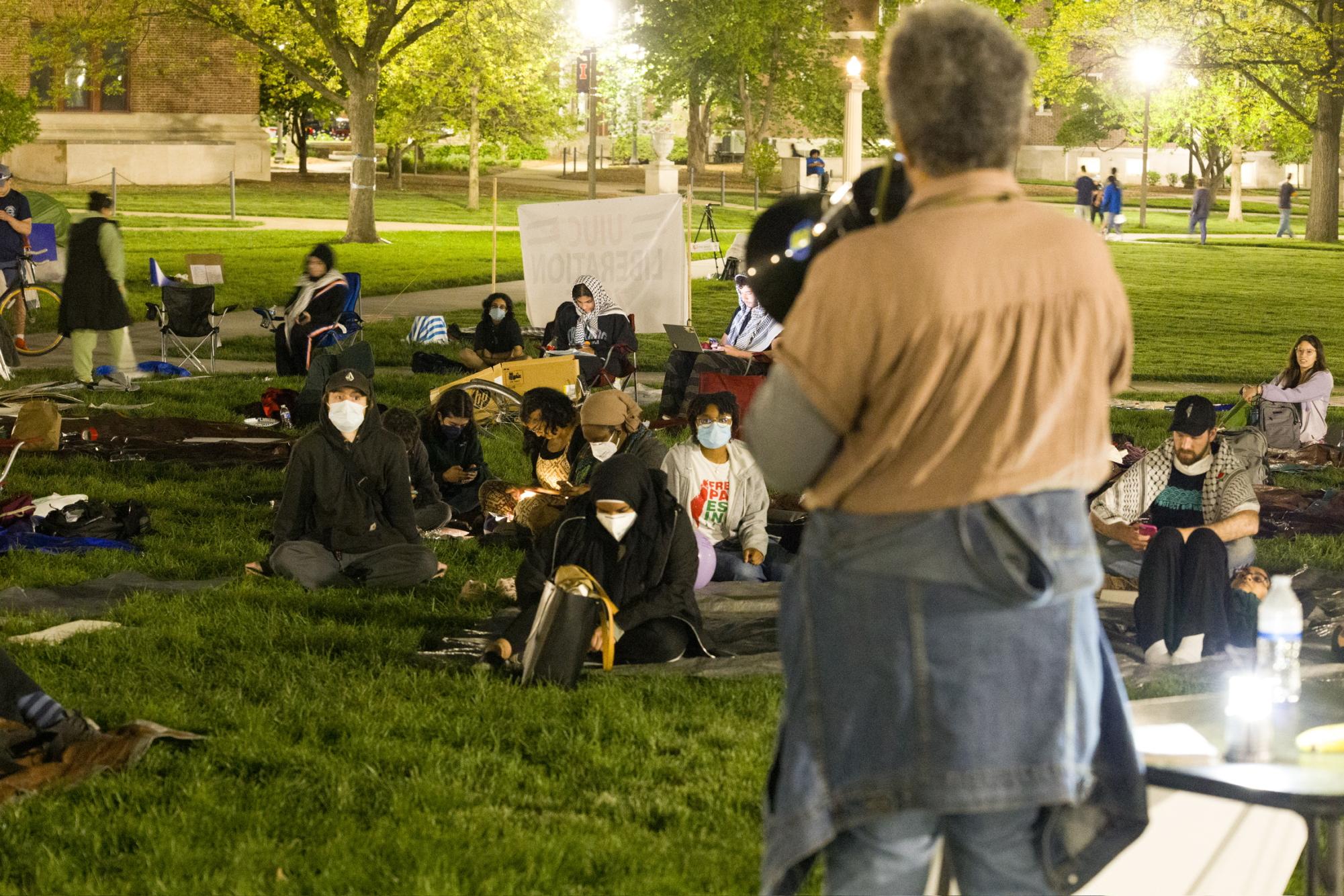
Tuesday evening at 8:25 p.m., University faculty member Teresa Barnes gave a scheduled “teach-In” presentation to members of the encampment.
The presentation drew historical similarities between the American movement against apartheid in South Africa during the 70s and the current solidarity on campus for the “Palestinian liberation movement.”
According to Barnes, the students who engaged in anti-apartheid protests across University campuses in the United States were some of the first to actively challenge the South African government from overseas.
Barnes read from writings produced at the University during the 70s protests, analyses produced within the encampment and some historical documents from the anti-apartheid movement.
Barnes also gave The Daily Illini comment on livestream about the presentation and its significance to the protest. She stated that she admired the “discipline” of protesters involved in the encampment, and noticed a lack of counter protesters.
Shortly after the presentation from Barnes, a group of people walked by the encampment and screamed antagonistic phrases at the protesters.
Phrases heard from the group included “30,000 of you b—–es,” and “Joe Biden is going to do so much.”
Programming for the evening in the encampment also included a showing of “Tell Your Tale Little Bird”(1993), a documentary film about militant women who supported anti-Israeli movements in the early 1990s.
By estimates from The Daily Illini, there were around 100 protesters in and around the encampment.
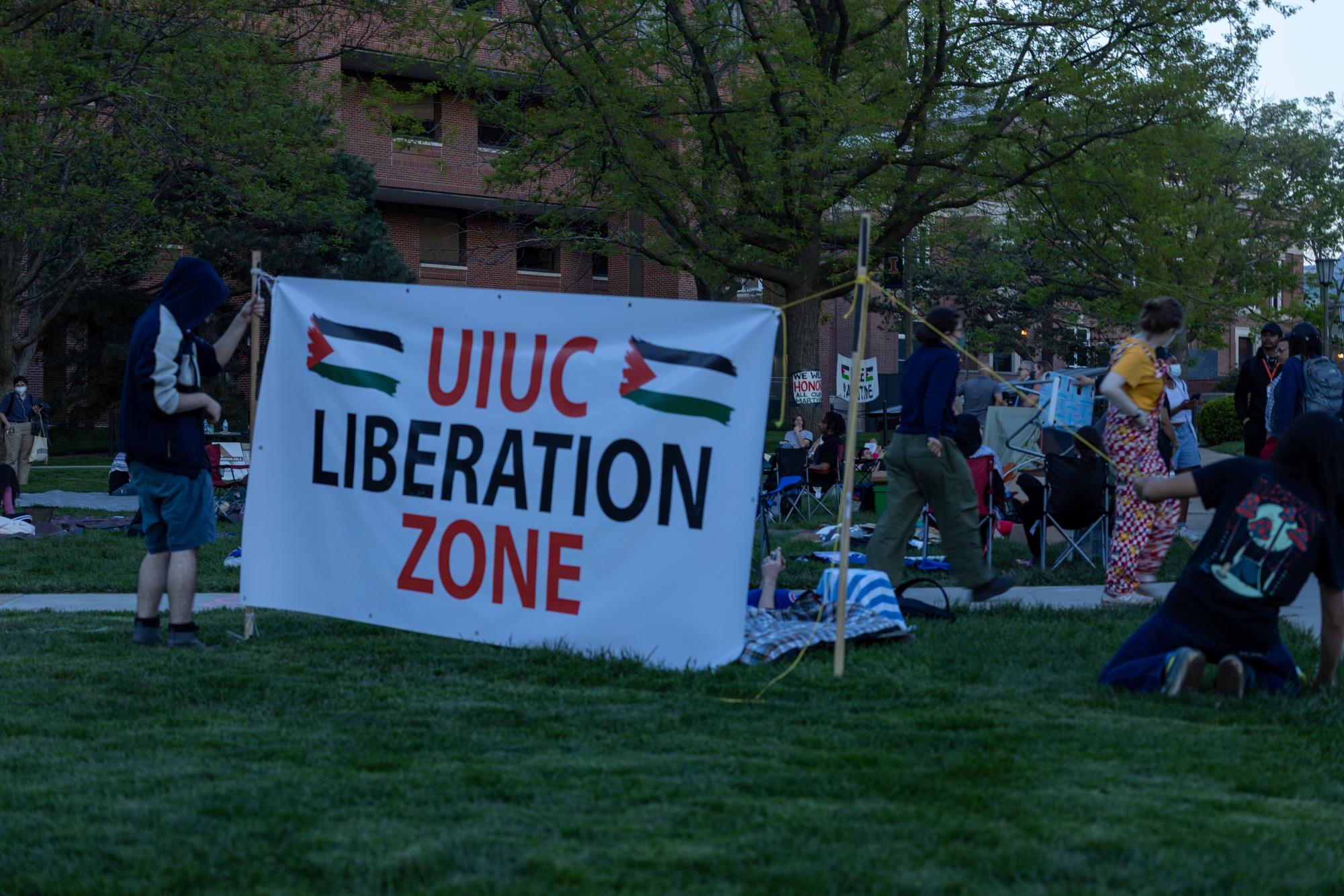
The encampment outside Foellinger Auditorium moved the sign labeled “UIUC Liberation Zone” farther north on the Main Quad, expanding the encampment to about 40 tents.
The Daily Illini spoke with a student representative from the ongoing encampment.
DI: So the sign was moved. Can you tell us a little about what’s going on?
Student representative: Oh, yeah. So the sign was moved because clearly the encampment is expanding, which is a very good thing. I’m hoping that the more the encampment expands, the more pressure it puts on the University to be more willing to meet with us to discuss our demands.
DI: So what is the symbolism behind the sign?
Student representative: Essentially it started off with Columbia SJP, and they were mirroring some student protestors in the 80s or 60s who had a Liberated Zone. So then Colombia started their encampment off with a Liberated Zone and then the national SJP call came out to everyone, so that essentially just started the encampment. It’s a Liberated Zone because, you know, it’s the area for divestment.
DI: How far are you hoping to go with the sign?
Student representative: I mean, the whole Main Quad. That would be nice. I don’t know, I think it’s not so much the sign is our perimeter. It’s kind of just there. I think as encampment goes the sign will go further. I mean, the goal is always divestment, so hopefully, we just go halfway and we get divestment.
DI: Do you have a head count on how many people you have in here right now?
Student representative: Right now? I don’t know. I want to say — because there’s some people in tents and some people on the other side — I want to say maybe 50 people right now. I’m really glad a lot more people have been starting to sleep at night here. I think that’s also why they moved the sign, so they can fit in more tents as well.
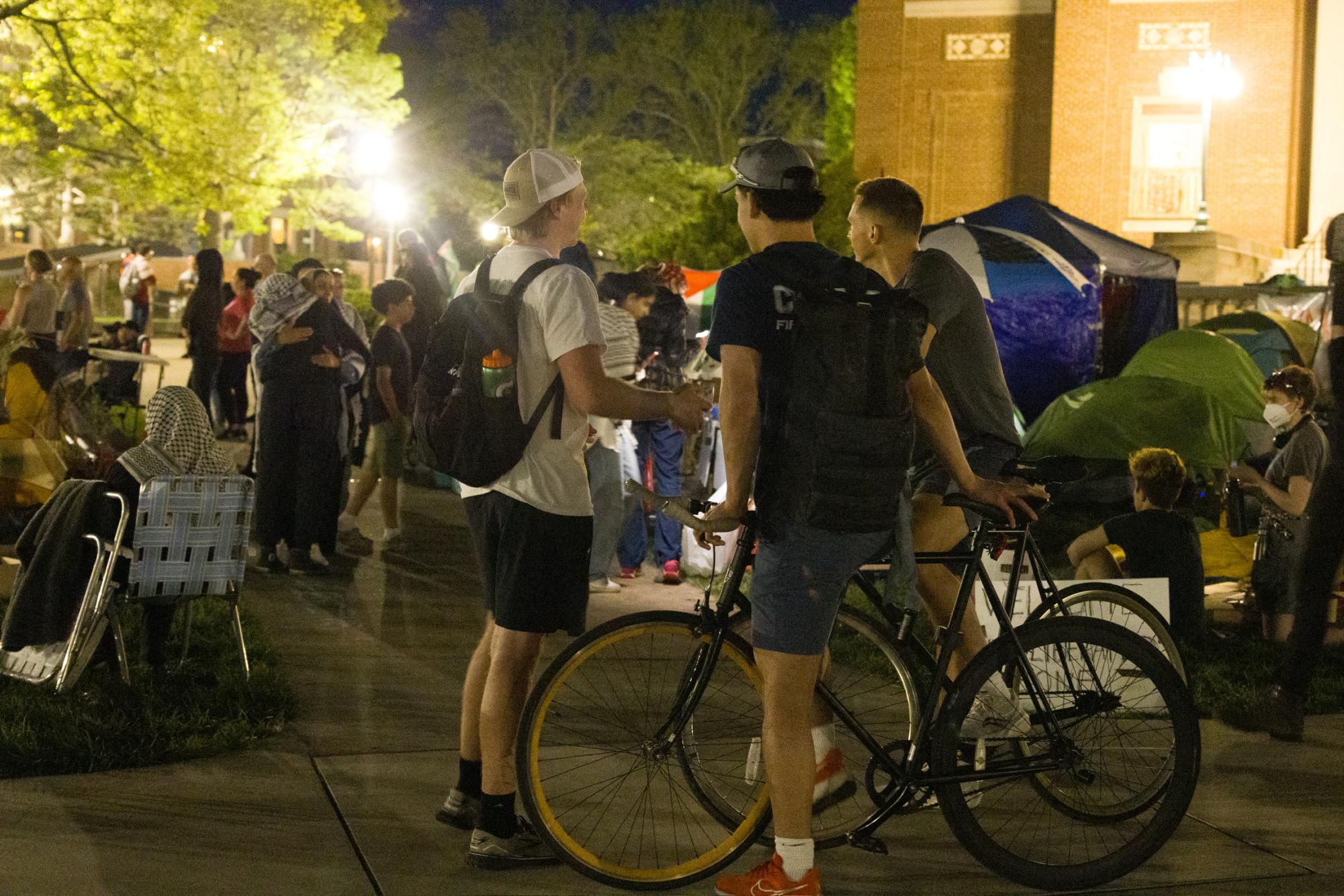
Tuesday afternoon, Students for Justice in Palestine released an Instagram post listing events they had programmed for the remainder of the day.
Among the events featured in the post were a book discussion, several prayers and a speech from a member of the Palestinian Youth Movement, an activist organization described on its website as “a transnational, independent, grassroots movement of young Palestinians in Palestine and in exile worldwide.”
The PYM speech, which was entitled “Student Resistance Movements for Palestine: How We Ended Up in Tents,” was scheduled for 5:00 p.m., but it eventually took place around 6:04 p.m.
In the address, the speaker explained the means by which PYM organizes its own protests, alluded to the Black Lives Matter movement’s resurgence in 2020 following the death of George Floyd, encouraged students to continue their demonstrations on campus and prompted participants to share their own experiences with organizing.
Several protesters responded to the prompt, with each sharing their reasoning for participation in the encampment.
“The reason I am here is basic empathy,” one student said. “If I was Palestinian, I would want this kind of support.”
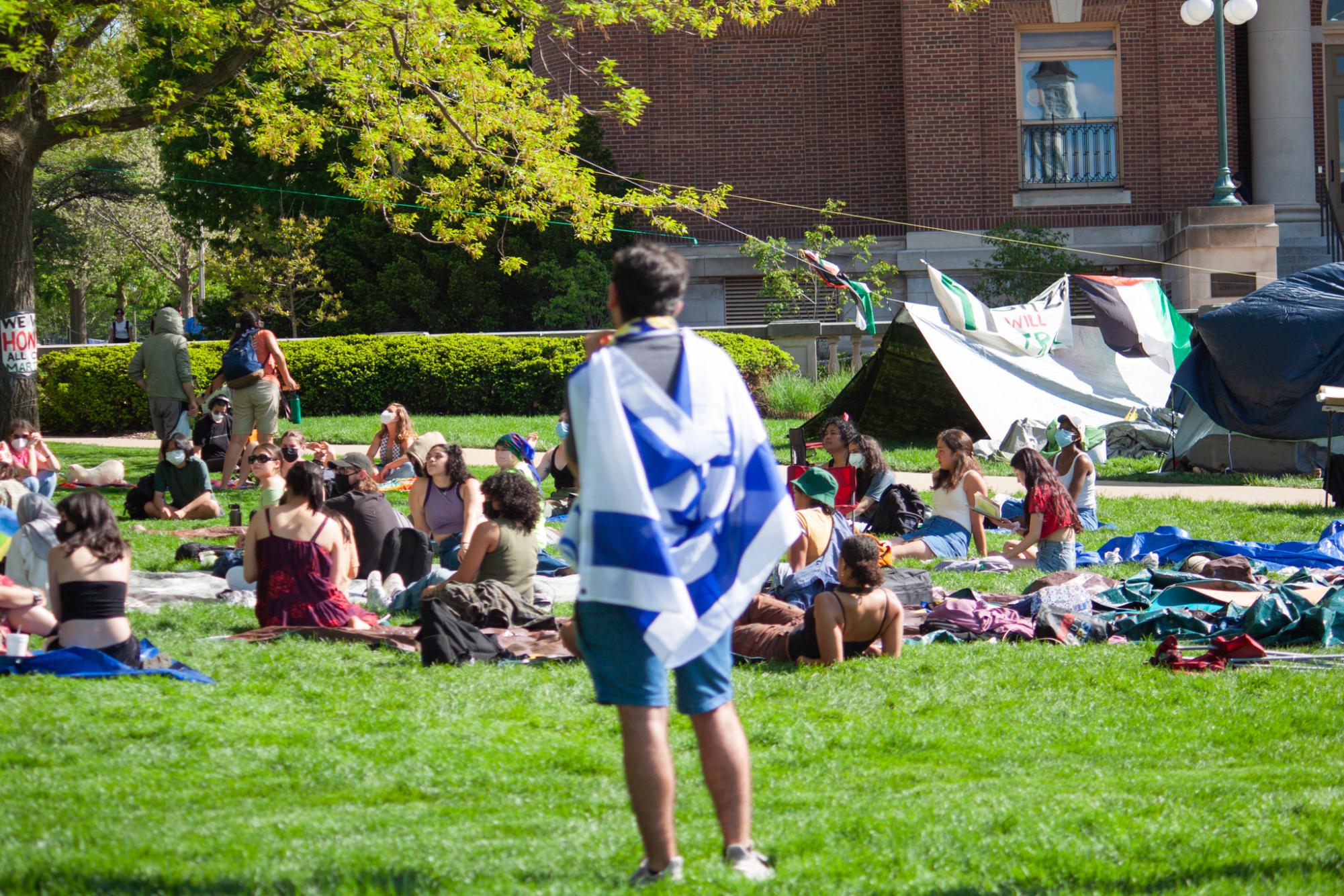
The Daily Illini interviewed a student who identified as a senior in Engineering who wished to remain anonymous. The student said he is not affiliated with any group that was gathering or protesting on campus.
Di: Is there any statement that you would like to give about any of the groups interacting today?
Student: I’m concerned about counterprotesters today — well primarily I’m very concerned about biased policing. As an observer, and as somebody who is keeping track of what is going on here and at other universities, I’ve noticed that, for example — correct me if I’m wrong — at Washington University pro-Israel counterprotesters, Zionist counterprotesters, intentionally shouted antisemitic sayings very loudly in order to paint the pro-Palestine or Palestinian Liberation protesters as antisemitic and hateful. Thereby painting a picture that essentially kind of allows for much more violent policing, and puts people in a lot of jeopardy, even though, from what I’ve observed, the Palestinian protesters are extremely peaceful (and) do not tolerate antisemitism whatsoever. But there is an element of instigation and intentionally creating this environment, so that police officers can go in and behave violently towards the encampment.
DI: The group that is present at the south end of the Main Quad has identified as protesters, but the group at Alma Mater are very adamantly not counterprotesters. Do you have any thoughts on that, or on these groups that you were talking about who are kind of instigating things? Do you think that is really their intention?
Student: I have no thoughts about that. This is just a concern that I have regarding how there is biased policing. There is a much higher standard and degree of burden placed on the pro-Palestinian side to prove that you are not violent, that you are not a terrorist, that you are not antisemitic. To show that what your values are are genuinely human rights and that you are genuinely saying this is a genocide and that it doesn’t have to do with religion or anything like that. Whereas, the similar burden is not placed on the Zionist crowd. Zionists in a way are above this burden of demonstrating that they are not hateful and this burden of displaying that they are not violent. This dynamic very much reflects all civil rights movements in the past from Black Lives Matter to the 1960s.
DI: How have these groups impacted your life on campus right now? Have they at all?
Student: They have, significantly. It’s extremely moving to see the diversity of voices and people who are involved in this encampment program. I know last night, or, I think it might have been Sunday night, they had a Seder with the Jews for Palestine group for UIUC. In that dinner they talked about displacement and dispossession and how the Jewish experience and the Palestinian experience have similarities. You know, at the same time, there are people who I thought may have never cared, who are suddenly gaining kind of a consciousness through seeing the encampment in person as opposed to something remote happening on their phones. So, I really see a lot of energy. It is warming my heart to see the number of people, people who I may not have thought have cared, to suddenly start caring about genocide and geopolitical issues that kill so many people that the United States is instigating.
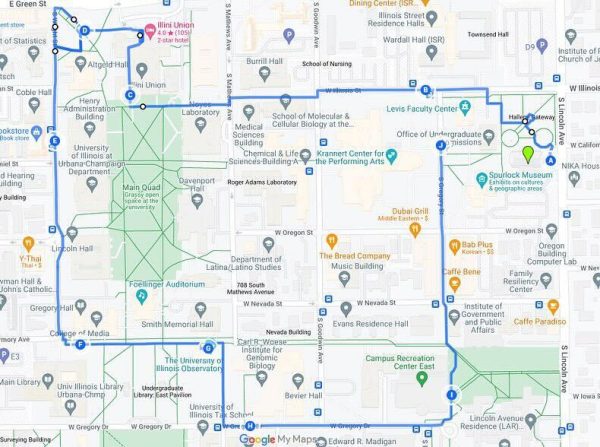
Campus tour routes have been changed to avoid the presence of the encampment on the Main Quad and today’s demonstration of Jewish pride at the Alma Mater.
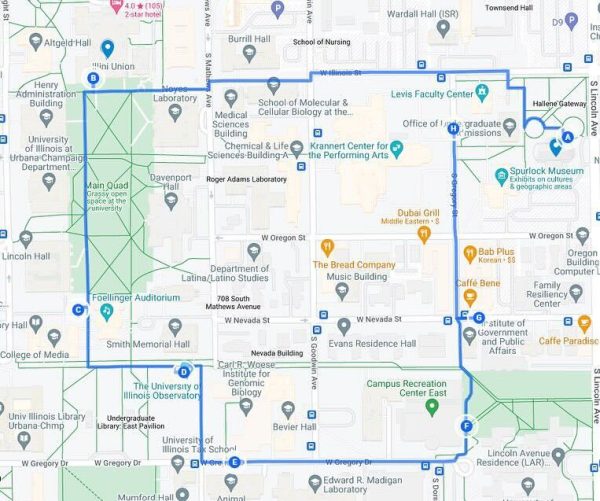
Upon reaching out to Cristina McNamara, coordinator of campus visits, The Daily Illini received a statement on Apr. 29 from Robin Kaler, Associate Chancellor for Strategic Communication:
“We respect the rights of freedom of speech and expression and remain committed to providing a safe environment for all members of our community. We hosted hundreds of admitted students and their families today, and the encampments have not impacted those visits.”
**This interview has been edited for length and clarity.**
The Daily Illini interviewed a student, Romi Rabinowitz, senior in Media, about the current Jewish gathering near Alma Mater.
DI: Can you tell me a little bit about what’s happening here today?
Rabinowitz: Today, we’re here not to counterprotest, but we’re here in celebration of Jewish life, and we’re here to support each other through the difficult times that we’ve been experiencing on campus so far, and just come together as one. We said a couple of prayers, we danced and sang. We are making sure that we keep the spirits up while everybody’s needing to lean on each other right now.
DI: How have the past couple of days been with the protests going on in front of Foellinger Auditorium?
Rabinowitz: The past couple of days, as well as the past six, almost seven months at this point, have been very difficult for our community. The protests on campus going on now are very difficult for us to see, especially because I know a couple of my friends have tried to interact with the protesters in a very respectful manner, just trying to open conversation, and haven’t been able to. And, you know, we’re just really here to have a conversation and understand each other’s point of view and each other’s sides, and some of the chants that we’ve been hearing recently on the Main Quad have been very scary to us, to be honest. A lot of hate speech, “From the River to the Sea,” basically calls for our people’s genocide while accusing us of genocide. So it’s been very difficult to be on campus in the past couple of days.
DI: Can you tell me a little bit about how you feel about the announcements and Massmails that have come out versus their reactions to it, the protesters’ reactions towards those announcements and Massmails?
Rabinowitz: I think our chancellor has tried his best to stay neutral and not support one cause more than the other cause. I think that I don’t know how much I agree with the fact that the encampments have been able to stay on the Main Quad, as it’s just generally disruptive to everyday life, as well as they have been told that the tents and other things are not allowed, as well as the hate speech that they’ve been chanting on the Main Quad. So I don’t know how supported I feel as a Jewish student by the administration completely, but I feel supported because of my own community.
The Daily Illini: What role do you serve here on campus?
Danny Faibishenko: I’m on the executive board for Chabad.
DI: This event that you guys are coordinating here today, why did you guys choose to come out to Alma Mater?
Faibishenko: The protest is across campus. And what people don’t understand is that this has an effect on the Jewish community. There are rises in antisemitism, and there are people that are scared to leave their homes or leave their apartments. The whole point of today was we were trying to bring everyone out to show that we are still one community.
We just wanted to show everyone here that they belong on this campus and they’re able to express themselves proudly. That’s what was behind choosing Alma Mater as the location, which is the central part, or the heart of campus.
DI: With the flags being hung up on Alma Mater, did you guys have to ask the University for permission to do that or were you permitted?
Faibishenko: We tried our best to follow every campus policy. It is perfectly legal according to the University.
DI: Is there any kind of message you want to send across campus and across the quad to any of the other students here right now?
Faibishenko: That the Jewish community is here and we are not going anywhere. We’re gonna continue being proud. We’re going to continue showing what we believe in spite of everything that’s going on.
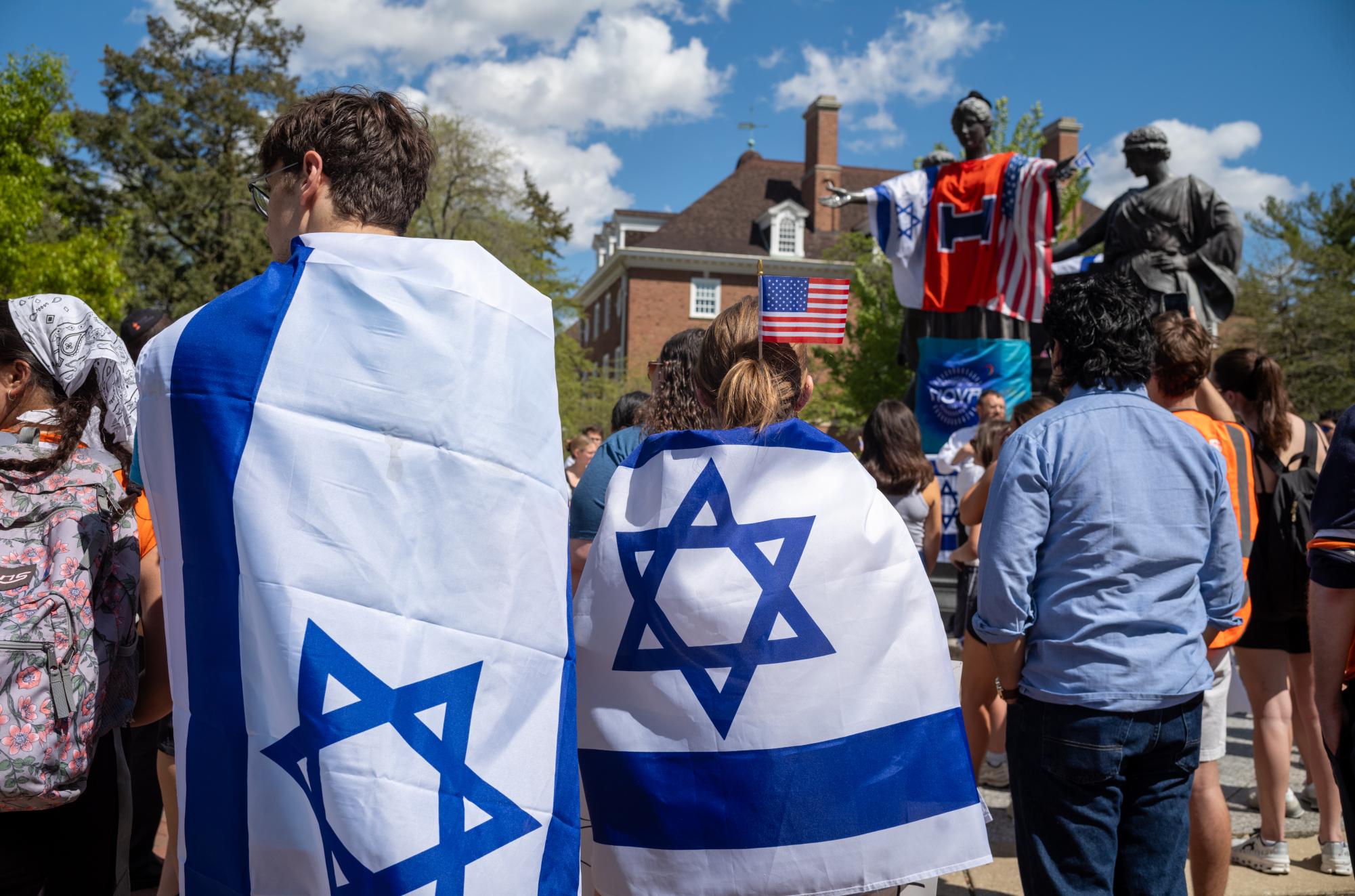
The Daily Illini: Can you tell me a little bit about what’s happening here?
Diane Gottheil: Oh, I’m very happy to see that the Jewish students have decided they’re going to come out and show their solidarity with Israel and with the Jewish people.
And when I hear that from the students, it’s reported that they’re afraid or something. I don’t think they’re afraid — they’re outnumbered. Jews have always been outnumbered, so now hanging together makes me feel very proud.
DI: How do you feel about the situation that’s going on by Foellinger today?
Gottheil: I’m not happy with that situation because I don’t think they’re very informed. I think if I ask one question about the history of the Israel-Arab conflict that started 100 years ago or more, they wouldn’t have an answer. They’re not, they’re ahistorical to put it nicely.
And I would also say that they know nothing about the attempts of peace and why they failed. So they’re just feeling good. I just read a James Baldwin piece in which he talks about protests and how they go bad. This was written in 1955, so it’s kind of brilliant. I just happened to read it and I said, oh, my goodness, it’s the same thing that’s going on with this group.
But, you know, whatever, I was arrested for protesting the war in Vietnam. But that’s because our guys were being killed, they were being drafted and killed and they were being made to kill other people and it was a completely different situation.
So there’s no comparison for the overall protests that are going on at multiple universities across campus because Students for Justice in Palestine is very well organized, good for them. They’ve learned that that’s what it takes, but I don’t think they’re sending the right message. I mean, if they really want justice in Palestine, talk about the fact that there are a million Israeli-Palestinian citizens who are minorities. So they have some issues, but there are also all the doctors in the hospitals there on, there’s one on the Supreme Court. They don’t know that, you know, we want to integrate the world, we don’t wanna, but the Jews need a safe place. My grandchildren are “half Jewish.” I want to know that in the future or somewhere they can go and be safe because given what’s happening now, I don’t feel that America is so safe anymore.
DI: Do you think that the communities on campus such as the Chabad and Hillel are providing a safe space for these students?
Gottheil: Oh, yeah. Sure, absolutely. But the campus should be a safe space, not just the Jewish organizations. We don’t expect the Latina-Latino students to have to go to their center to feel safe. We have to feel safe everywhere.
The Daily Illini spoke with Ben Shapiro, junior in LAS and the president of Hillel, about his experience being spat on while at the demonstration of Jewish pride.
DI: Can you tell me a little bit about what happened here?
Shapiro: With regard to the overall event?
DI: With your personal experience right now that just happened.
Shapiro: Are you talking about the student that spat? I only saw him briefly. He said something about killing children. I didn’t kill any children. No one here killed children, but obviously that’s not what he’s referring to, right? He’s referring to the situation in Gaza where you have Israeli Defense Force soldiers going in and targeting Hamas, and as a result of it being a war, there are innocent civilians dying. I by no means condone that that’s not okay, but at the same time, I mean, that’s war. I ask why is the war happening? What’s the cause? And this is a direct result of Hamas terrorists going into Israel and killing 1,000 Israeli civilians, not military targets, civilians. So obviously there has to be a response. You cannot just have terrorists living next door, and so the choice was made to send the IDF to go target Hamas. When we were fighting Germany in World War Two, we were targeting their military just as Israel is targeting Hamas, and unfortunately innocent civilians are going to die. I mean, urban warfare is a complicated thing. Once again I’m not excusing the deaths of civilians or the deaths of children, but understand this is a result of Hamas. The deaths of those children are not nearly as much on the IDF as it is on Hamas. Had Hamas not come into Israel and literally burned children alive in their cribs we would not be in the situation.
DI: Can you give me a little bit of a play-by-play of what happened with the pro-Palestinian protester today?
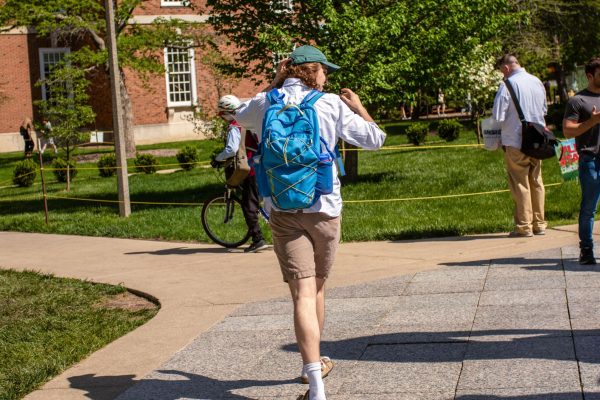
Shapiro: He came by and he just spit his drink out at us and called us baby killers. I mean, just disgusting. But, you know, it kind of shows I want to talk about two things. Number one, we’re not scared to be here. You don’t see us wearing masks. You don’t see us covering our faces. You don’t see us hiding our identities. You see that in the encampments, right? But we’re proud to be here. Number two, no one here wants any violence against those students. We purposely chose this location right here so there’d be no confrontation. This is not a counter-protest. We’re not trying to make a statement necessarily against the encampments. What we’re doing here is we’re proud to be Jewish, and when they come over here and spit on us and call us “baby killers,” I think it’s pretty obvious who’s in the right.
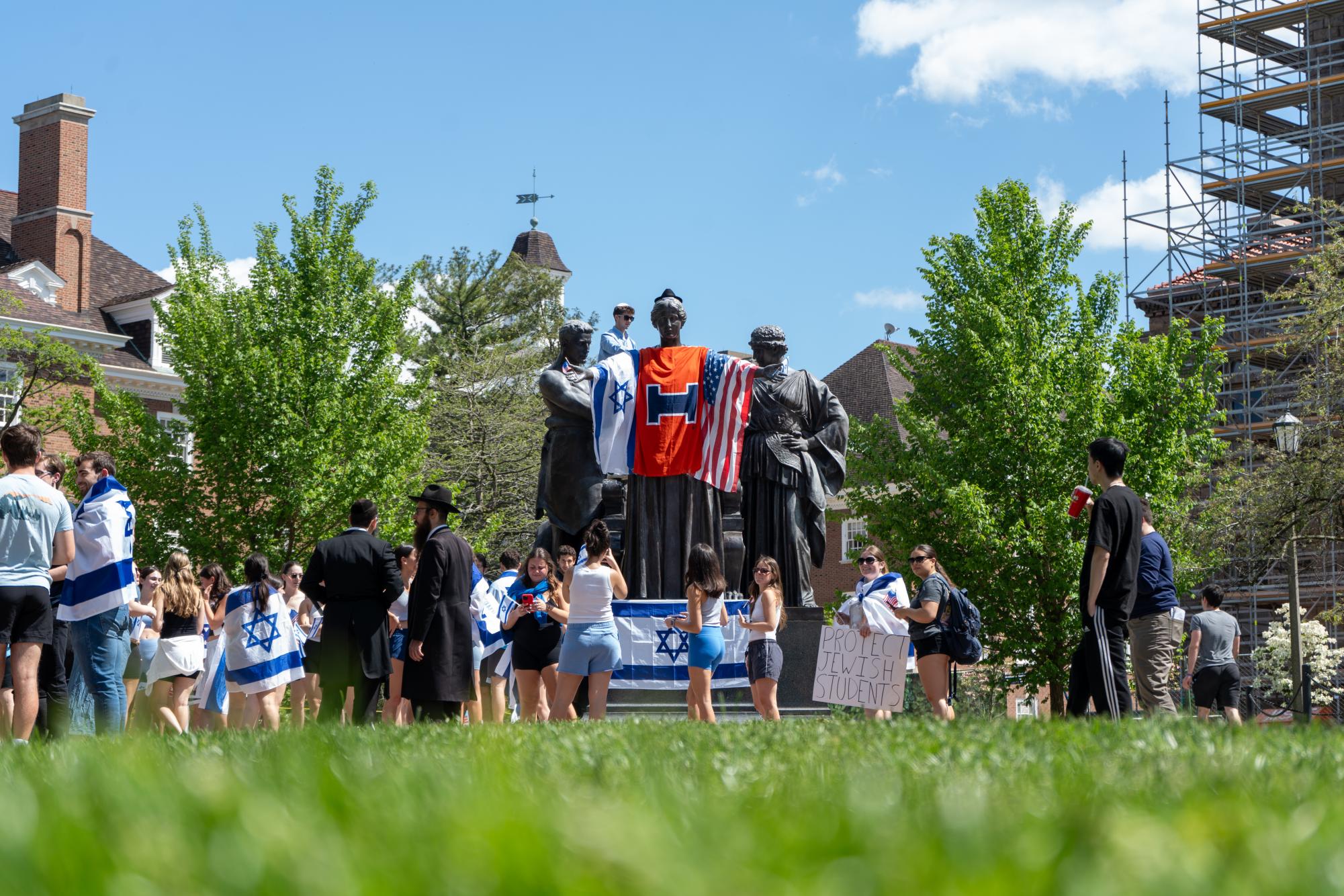
A group of Jewish students and leaders on campus gathered at the Alma Mater statue for a display of Jewish pride around 2 p.m. this afternoon.
In an email from Jewish student leadership on April 29, they wrote to Chancellor Jones, “speaking for a large community of students who sit, fearful to leave their homes, attend class, and speak out about the open antisemitism that has plagued our campus these past days.”
The statement said the protest “has not appeared out of coincidence during a time of great celebration among (Jewish people),” in reference to Passover.
“Make no mistake, this protest is not solely about the situation in Gaza but rather serves to instill fear into our community, in hopes that we will stay silent and to make us pariahs on campus,” the statement said.
The email, which includes signatures from the President of Hillel Ben Shapiro, President of Chabad Ellie Scott and presidents of various Jewish fraternities and sororities on campus, implored the university to enforce campus policy and put an end to the encampments.
“We call on the University to uphold their policies, hold those who violate them accountable, and remove the encampments at the heart of our campus, the main quad, as soon as possible,” the statement added.
The Daily Illini had a conversation with David Green, a bystander who identified as a supporter of the Palestinian justice movement.
DI: What brings you to the Main Quad here today?
Green: I’m a supporter of the Palestinian justice movement, and I have been for the last 30 years. And I have been for the last 25 years that I’ve lived in Champaign. I’m of Jewish background, and I’ve been involved both in the general anti-war movement since 9/11 here, and I’ve also been involved in the movement for Palestine, starting back in ‘99, and then all the way forward for 25 years here. I was involved with SJP from 2001 to 2014, just as an adult, as a non-student, of course, as an employee of the U of I.
I’m just here to support, to be one little part of this historic series of events that I hope will lead not to just justice for the Palestinian people, but to a transformed Middle East, in which the national liberation movements that are active now in Palestine, Lebanon, Syria, Iraq, Yemen — vis-as-vis Israel and vis-a-vis American military intervention in the region, that that movement, guided by Iran in a very patient, strategic, tactical way, will over the next coming years, transform the relationship of the United States, with the region, from an imperialist and colonialist relationship to something, obviously, much more equal, and much more empowering to the people of that region.
DI: We’ve had some passersby like yourself talk about seeing protests similar to this back in the 90s, for example with anti-apartheid protests and things like that. What does it mean to you to be seeing students today making this encampment, similarly to what we’ve seen in the past?
Green: It means a lot to me. I admire them. I think they’re showing that they’ve had their ears open during their — in relation to me — relatively short lives. I’m almost 74, so I’ve had, you know, 60 years of my life to both support Israel and then to understand Israel, and then to struggle against Zionism. And I’m glad that at a young age, they can get started with this. They’re at a historical moment, which is really propitious, which is really full of hope and meaning, and transformative possibilities for this country and for the Middle East, and for the world as a whole, as American imperialism starts to wane, as it becomes clear that the American ruling class and the American military and the American sort of technological class can’t control the world with all its money and all its weapons.
DI: When you were over there speaking with some of the students who are participating in the encampment, did they have anything interesting to share? Were you able to share some good conversations with them?
Green: I was just telling them about my background, and we agreed that when they want to have somebody to speak about these things, who’s been in the community for 25 years, who’s been involved with this movement for 30 years, and has been politically aware for, you know, 60 years. If you go back to say when I was 13, then I would be able to, but basically, I just want to know what it is that people, younger people, may feel that they don’t understand because you get a lot of curveballs. You get a lot of obnoxious people saying a lot of obnoxious things about the Palestinians and Zionism and so forth. And it’s a relief that that’s coming to an end now. It’s a relief that even Jewish communities, including the one in this community, are a little bit on their heels. They’re not being very outspoken about what’s going on, because people have, you know, the wheels turned quite a few times since the 1960s, since the 90s. Since 10 years ago, the wheel was turning and it’s a different world and you’re in a different world. And I think you can have a lot of hope. If you’re in your late teenage years or in your 20s you can have a lot of hope that if you live a normal lifespan, you’re gonna see huge positive changes there. We’ll have to see huge positive changes. Otherwise, this country is going to be in a lot worse shape than it is now. And it’s not in very good shape right now.
DI: Is there anything else you would like to share with us?
Green: Just you know, if this gets published in any form, you’re welcome to use my email address, which is [email protected]. And people are welcome to contact me with good faith concerns about this movement from any perspective.
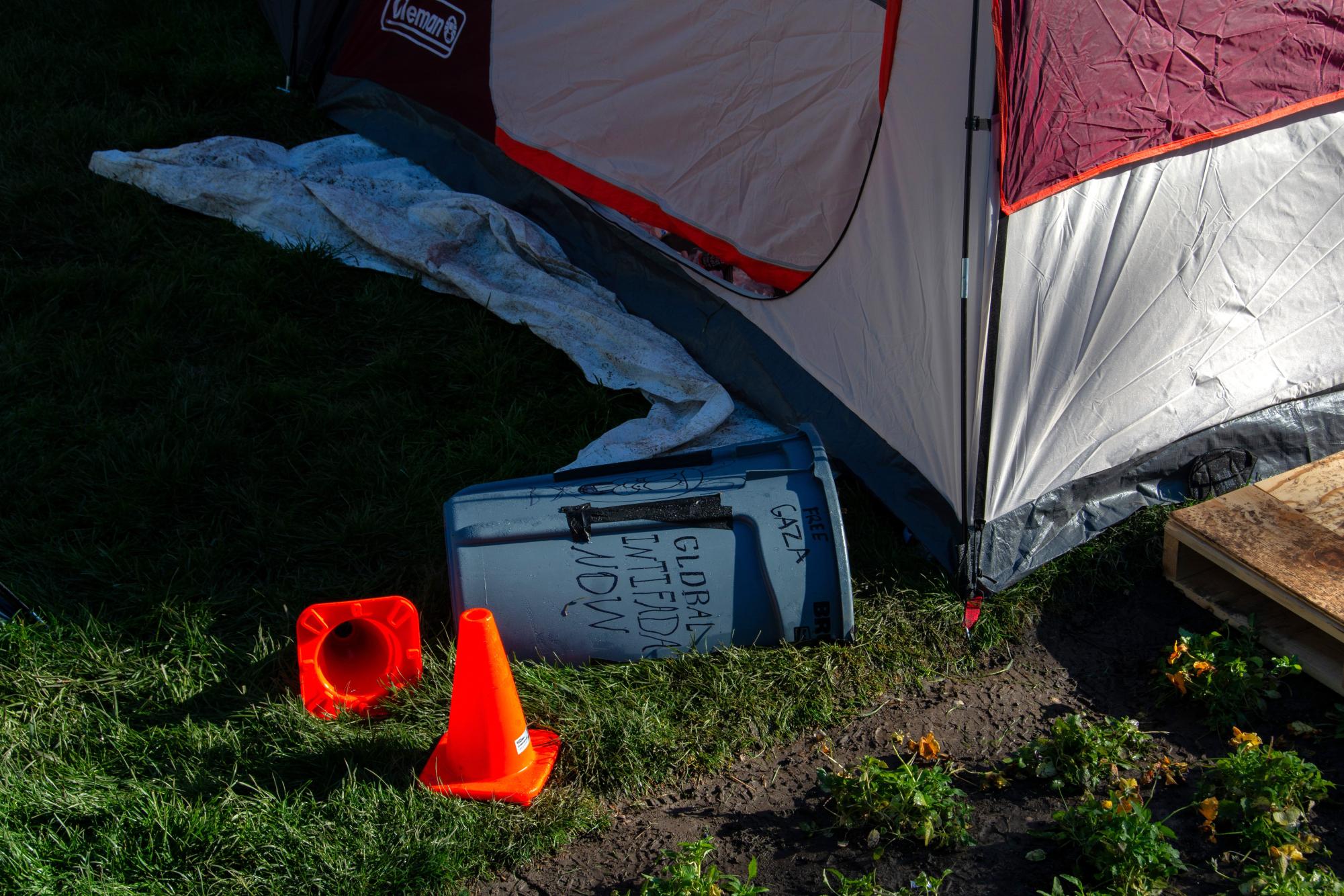
University alumni started a Change petition, detailing their support to current students and attendees. The petition is titled “UIUC Alumni: Pledge to Never Give until Divestment from Israel” and currently has 207 signatures.
Alum Buthaina Hattab started the petition. In it, Hattab wrote, “Until UIUC agrees to fulfill these demands, we pledge to never give nor participate in the University as alumni.”
